Their Lives Would Never Be the Same. In Some Ways, Neither Would Mine.
I met Lt. Col. Benjamin Palmer when he took command of my first fleet unit in the summer of 2009. Later that year, I attended a Christmas party at his home, a place filled with family photographs and collages from each of his duty stations and their respective time zones. What stood out the most, though, was the warm way Palmer and his wife, Leafa, took time with each guest, making sure we all felt welcome and comfortable.
I saw Palmer for the last time the following December at the base officer’s club. I was transferring to a command squadron set to deploy to Afghanistan in two months’ time. Palmer and I both spoke about our futures—after 20-plus years in the Marines, he planned to retire and spend more time with his family. I remember feeling happy for him.
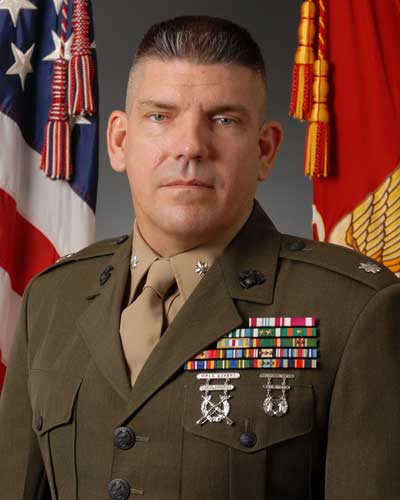
Lt. Col. Benjamin Palmer, former commanding officer of the 2nd Low Altitude Air Defense Battalion, was shot and killed by a gunman dressed in an Afghan police uniform on May 12, 2011. Photo courtesy of the II Marine Expeditionary Force.
Soon, though, my thoughts focused on the task at hand: providing the 2nd Marine Aircraft Wing (Forward) with a tactical headquarters and command of other units within the Marine Air Control Group during the troop surge in Afghanistan. Countless hours went into training to coordinate aircraft in difficult situations.
My unit arrived at Camp Leatherneck in Helmand Province, Afghanistan, in February 2011, and we quickly settled into eight-hour shifts at screens that provided reports from the battlefield. “Troops in contact” signaled a firefight or an improvised explosive device or suicide attack. “Urgent evacuation” meant someone had suffered a life-threatening injury and needed care right away. A phone call often followed, amplifying details of troops’ injuries, many catastrophic—multiple gunshot wounds, the loss of one or two or four limbs.
We took and processed information, tasked medical evacuation helicopters, and sent support aircraft to injured service members. Many troops did not make it to the helo or died on the way back to the base. The losses came as gut punches, but there was little time to dwell on them as we gridded coordinates and found the best aircraft as quickly as possible for the ground units under fire or for troops entering an ambush area.
We broke the tension with jokes and references to our favorite movies, shows, and video games, and did impressions of actors and politicians. It felt good to laugh, and as the days blurred together, I held onto the knowledge that our work helped save American troops and deal blows to the enemy. My work in Afghanistan felt significant.
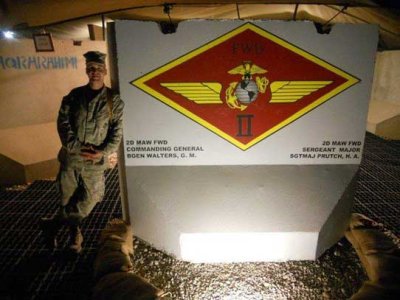
First Lt. Joel Searls at the 2nd Marine Aircraft Wing compound aboard Camp Leatherneck in Afghanistan in 2011. Photo courtesy of the author.
Three months in, on the morning of May 13, I entered the command center as usual. But something was off—no one spoke, and the tension seemed greater than usual. A few friends quietly said hello. As I took my seat, the general of our forward unit walked in.
“Attention!”
We all stood as the general spoke to us.
“We lost one of our own last night. Who in here served with Lt. Col. Palmer?”
My mind raced before settling on that final memory of my former commander. He’d planned to retire. It must be another Palmer, I thought.
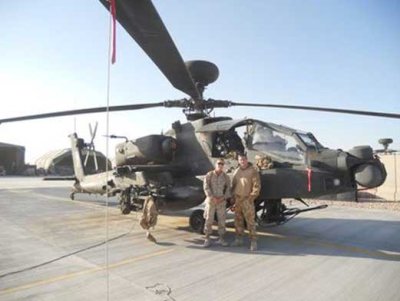
First Lt. Joel Searls with a British pilot alongside his Apache helicopter with the Joint Helicopter Force Afghanistan unit from the United Kingdom. Photo courtesy of the author.
A fellow lieutenant raised his hand. We’d served together under Palmer, but the lieutenant was a prior enlisted infantry Marine who’d served in Iraq. Surely he knew this Palmer from his days in Iraq.
“If anyone wants to speak with me in my office about their time with Lt. Col. Palmer, my door is open,” the general said. “Does anyone have any questions?”
I raised my hand slowly.
“Yes, son?”
“General, sir, what was Lt. Col. Palmer’s first name?” I asked.
“Benjamin.”
WHAM.
As the news hit me, I thought of his wife and children, who would get the news soon.
“Hey, Searls,” the lieutenant colonel of the Current Operations floor told me. “Take some time away. Thirty minutes or so. We’ll cover your position.”
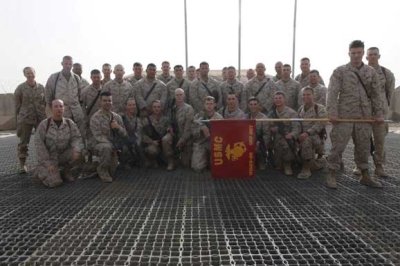
Marine Air Control Group 28 is renamed for Lt. Col. Benjamin Palmer eight days after he was shot and killed in Afghanistan in May 2011. Photo by Cpl. Rashaun James, courtesy of the Marine Corps.
“Nah, I can handle it.” I sat down and couldn’t focus. “OK. Maybe I will take a few minutes.”
I got up and headed to the alternate command center, where my officer in charge and our senior noncommissioned officer greeted me. As we shared memories of Palmer, his death seemed all the more impossible.
Palmer did have plans to retire. But he’d deferred his retirement to oversee the Afghanistan National Civil Order police. Palmer was three weeks into a yearlong deployment in Afghanistan when he and another Marine were shot and killed inside an Afghan Civil Order police compound near the Pakistani border. According to news reports, Palmer had just sat down for lunch with his Marines and our partner forces when a gunman wearing an Afghan police uniform opened fire.
Palmer was medically evacuated but did not survive the flight. He was 43 years old.
I kept thinking of his wife and children. Soon, I knew, they’d receive a visit from a casualty assistance officer and chaplain. I said a prayer for them. Their lives would never be the same.
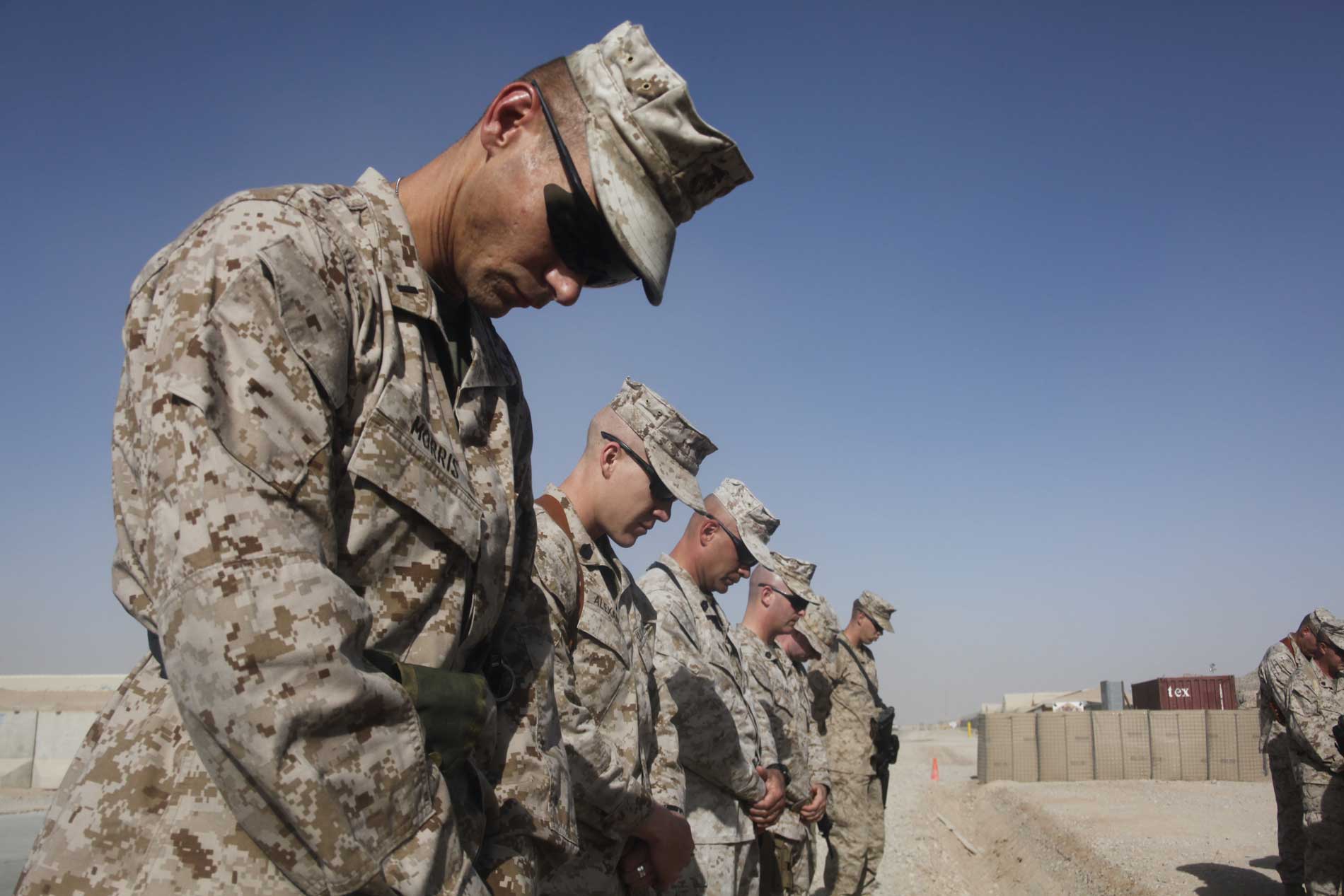
Marines bow their heads during a dedication ceremony at the Marine Air Control Group 28 compound at Camp Leatherneck, Afghanistan, held in memory of Lt. Col. Benjamin Palmer. Photo by Cpl. Rashaun James, courtesy of the Marine Corps.
In some ways, neither would mine.
More than a decade has passed since that day, but I return to it often. I think of his wife and his children. Have they recovered? What are they like today? What would Palmer be doing now? Would he be a grandfather? Have a grandchild on the way?
Our Journalism Depends on Your Support
And what about all the other lives lost in Afghanistan? The ones we didn’t know but whose deaths we learned about on screens and in telephone calls? What price did we pay in that war?
Only my faith gives me peace. I pray that somehow, some way, something good will come from all of it.
I’m still waiting.





Comments are closed.